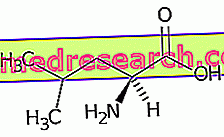Generality
L-Carnitine is an amino acid derivative synthesized in the human body, mainly in the liver and kidneys.
Called simply Carnitine, it is synthesized from two amino acids - Lysine and Methionine - in the presence of Niacin, Vitamin B6, Vitamin C and Iron.

L-Carnitine is used as a nutritional supplement in both clinical and sports settings.
Indications

L-Carnitine - Chemical Structure
Carnitine in foods
Carnitine is contained mainly in foods of animal origin such as meat and dairy products. Also avocado and Tempeh (fermented soybeans) are good sources of Carnitine.
Deficiencies of Carnitine in Vegans and Vegetarians
Given the prevalence in animal products - and considering that this amino acid is synthesized from two other essential amino acids (not synthesized by the body at sufficient speed to meet metabolic demands) - people who follow a vegan diet may experience Carnitine deficiency.
More controlled, on the other hand, would be the intake of Carnitine in vegetarians, in which a 10% reduction in the plasma concentrations of this amino acid was observed compared to the omnivorous population.
| Food | Milligrams of carnitine (mg) |
|---|---|
| A beef steak 113 grams | 56-162 |
| Ground grilled, 113 grams | 87-99 |
| Whole milk (240 ml) | 8 |
| Cod, cooked, 113 grams | 4-7 |
| Cooked chicken breast, 113 grams | 3-5 |
| Gelato (120 ml) | 3 |
| Cheese 57 grams | 2 |
| Bread, 2 slices | 0.2 |
| Cooked Asparagus (120ml) | 0.1 |
Why is L-Carnitine used? What is it for?
L-Carnitine is an amino acid derivative, used for several years now as a nutritional supplement.
By virtue of its biological role, fundamental in:
- Facilitate the entry of LONG chain fatty acids into the mitochondria, where they are oxidized to produce energy (from a biochemical point of view, Carnitine performs its functions by participating in a complex mechanism called carnitine acyl-CoA transferase);
- Keep the AcetylCoA / CoA ratio within the cells constant
- optimizing the conversion of pyruvate and LACTATE to AcetylCoA
- and simultaneously carrying out an indirect antioxidant action, especially against cells with high metabolism, such as cardiac and muscular cells,
L-Carnitine has been used in various fields.
Currently the integration with L-Carnitine is suggested in cardiology (eg Carnitene ®)
- for its cardio and vasoprotective properties,
- for its ability to contribute to the improvement of the lipidemic picture, guaranteeing a reduction in blood concentrations of triglycerides and an increase in those of HDL cholesterol.
Supplementation with L-Carnitine would be fundamental even in patients with primary and secondary Carnitine deficiency, as well as in patients suffering from neurodegenerative diseases (the use of Acetyl-L-Carnitine would be better in the latter case).
Despite the scarce evidence on the subject, supplementation with L-Carnitine is also suggested in the sports field to enhance energy capabilities as well as improve athletic performance and body composition.
Property and Effectiveness
What benefit has L-Carnitine shown during the studies?
The many years of experimentation, mostly conducted on laboratory animals, have allowed to adequately clarify the biological role and the potential clinical and integrative applications of L-Carnitine.
Despite this, there are still many concerns regarding the use of L-Carnitine in certain areas, such as sports, in which top experts are still working to obtain reproducible data.
L-Carnitine and cardiovascular function
Particularly interesting would be the results deriving from several studies, related to the effectiveness of the integration with L-Carnitine in maintaining the adequate state of cardiovascular health.
Significant improvements would have been observed in patients affected by claudicatio itermittens (intermittent lameness), dyslipidemias with increased atherosclerotic risk and peripheral vascular pathologies.
In addition to the appropriate adjustment of clinical and laboratory values, in these patients a clear improvement in the quality of life would also have been observed.
L-Carnitine and systemic Carnitine deficiency
Systemic Carnitine deficiency is a rare autosomal recessive genetic syndrome characterized by a severe and progressive clinical picture characterized by cardiomyopathy, skeletal myopathy, hypoglycemia and hyperammonemia.
In this context, the use of L-Carnitine, at pharmacological dosages, therefore of strict medical relevance, would have proved very useful in controlling the progression of the disease and in improving the overall health status of the affected patient.
L-Carnitine and sport
It is known that aerobic exercise causes a gradual increase in blood concentrations of fatty acids, probably due to a saturation of their mitochondrial transport means (including the system in which Carnitine participates).
Despite the very strong rational basis, which would justify the ergogenic and improving role of L-Carnitine in relation to athletic performance, and a very large amount of studies, the effectiveness of supplementation with L-Carnitine in sports has not yet been all proven.
Indeed, some bibliographic works show that:
- No ergogenic effects were observed with L-Carnitine supplementation (2g for 7 days) during repeated cycles of high intensity anaerobic exercises, despite the high serum levels of carnitine (Int J Sports Med 1994; 15: 181-5).
- No improvement in performance and resilience in marathon runners was observed (Eur J Appl Physiol Occup Physiol. 1996; 73: 434-9)
- No ergogenic effects, maximal VO2 elevation and performance improvements were observed (Am J Clin Nutr. 2000; 72: 618S-623S).
However, these studies are contrasted with others, in a clear minority, according to which supplementation with L-Carnitine would be beneficial during training, competition and recovery from extreme exercises (Nutrition 2004; 20: 709-15).
L-Carnitine and overweight
Precisely because of the role of mitochondrial transporter of long chain fatty acids, Carnitine has always been attributed lipolytic activities, potentially useful in the fight against obesity.
Numerous studies, both experimental and clinical, have however underlined the inability of supplementation with L-Carnitine to induce an appreciable and statistically significant improvement in body composition and in particular a reduction in fat mass.
Doses and method of use
How to use L-Carnitine
Although there is no recommended standard intake level, the average Carnitine dosage ranges from 500 to 2000 mg per day, preferably divided into several assumptions.
In particular pathological conditions (cardiac ischemia and other cardiovascular problems), under strict medical supervision, this dosage can reach 15000 mg (6-15 grams of Carnitine per day).
Side effects
The use of L-Carnitine, especially if carried out at high doses, could cause the appearance of nausea, vomiting, abdominal cramps and diarrhea.
In some categories of patients at risk, the use of L-Carnitine, albeit rarely, could increase the frequency and severity of some psychiatric symptoms, including for example the sense of agitation and behavioral disorders.
Contraindications
When should L-Carnitine not be used?
The use of L-Carnitine is contraindicated in patients with established hypersensitivity to the active ingredient.
Despite the presence of some experimental studies, conducted on small laboratory animals, the absence of adequate clinical trials extends the aforementioned contraindications to the use of L-Carnitine also to pregnancy and the subsequent period of breastfeeding; except for particular pathological conditions of strict medical specialist competence.
Pharmacological Interactions
Which drugs or foods can modify the effect of L-Carnitine?
Concomitant use of didanosine, zalcitabine, stavudine, valproic acid, and some antibiotics may compromise the normal pharmacokinetic and pharmacodynamic properties of L-Carnitine.
Clinically relevant deficiency states of Vitamin C could also contribute to the onset of secondary L-Carnitine deficiency.
Precautions for use
What do you need to know before taking -L-Carnitine?
The use of L-Carnitine should be closely supervised by the doctor in case of contextual presence of cardiovascular pathologies, neurological pathologies, psychiatric pathologies and pharmacological therapies.



